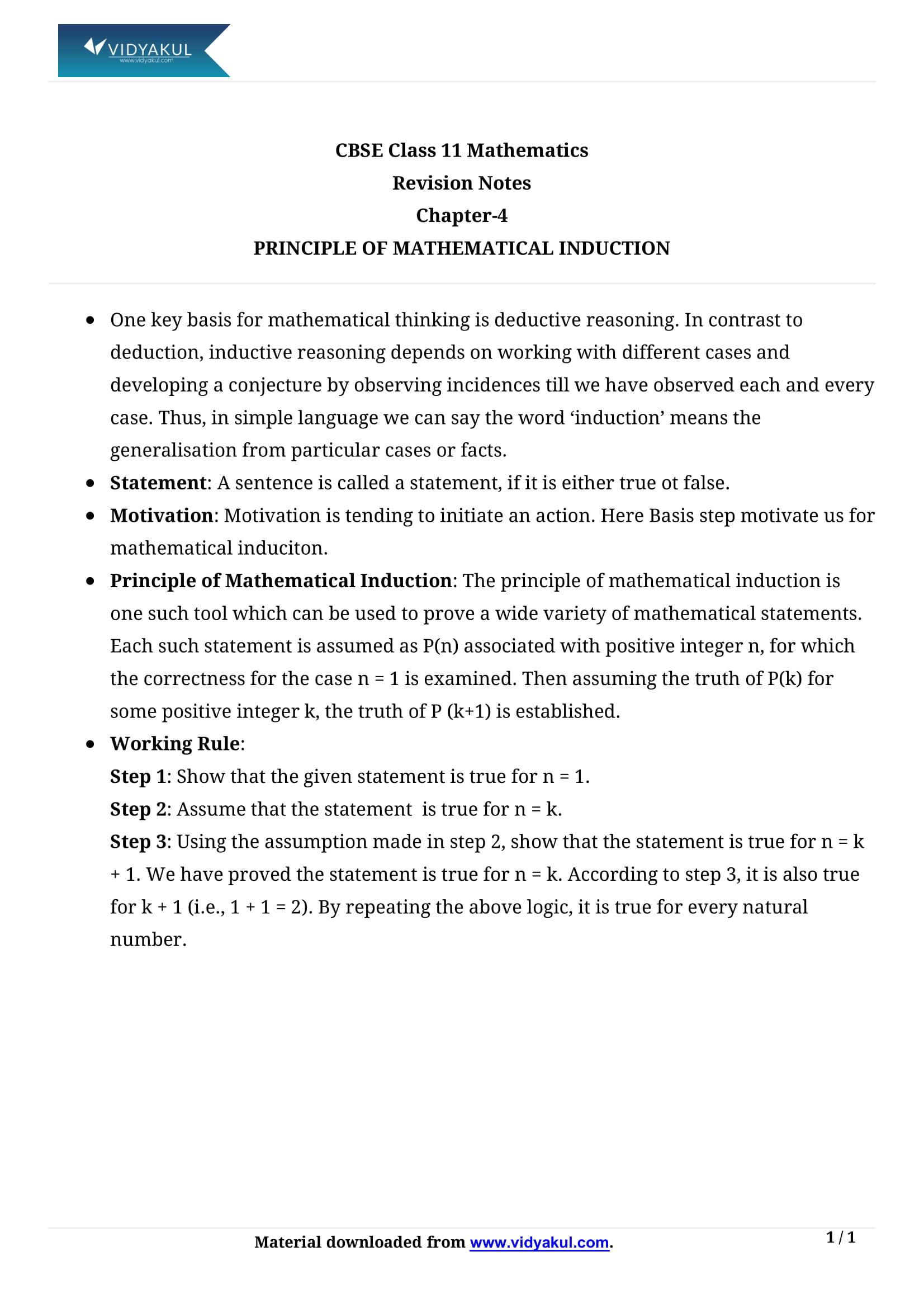Principle of Mathematical Induction Class 11 Notes

Chapter 4 Principle of Mathematical Induction
Mathematics for Grade 11 Chapter 4 explains the principles of mathematical induction. In this article, we have provided NCERT notes prepared by Vidyakul subject experts according to the latest guidelines to ensure that students do well in this chapter.
NCERT Grade 11 Math Chapter 4 notes are prepared in a detailed, step-by-step format to help students understand concepts and practice textual questions. Students can download NCERT Math notes for Year 11 and review their notes offline. For best practice, you need to understand the various concepts in Year 11 Mathematics Chapter 4. Read on to learn more.
MATHEMATICS NOTES CHAPTER -4
Points to Remember
We have provided some important points that are covered in NCERT Class 11 Maths Chapter 4 to help students in their exam preparations. Refer to the list below:
A sentence or description which can be judged to be true or false is called a statement. Statements involving mathematical relations are called mathematical statements.
The proposition or statement P(n) can be proved by the principle of mathematical induction for n∈N as discussed in the following three steps:
The first step is also termed the basic step of induction in which we prove that the proposition P(n) is true for the smallest positive integer or the first natural number i.e, for n = 1. This is also called the verification step.
The next step is the induction step in which the proposition is assumed to be true for some n = k ≥ 1 i.e, we assume P(k) to be true.
The last step is the generalization step. If P(k) is true, then the proposition is proved true for n = k + 1 i.e, for the next positive integer or the next natural number.
Thus, P(n) is true for all n∈N.
Topics and Sub-topics
This chapter explains what mathematical induction is and how it works. This is explained with the help of examples. The principle of mathematical Induction states that to prove a statement about every natural number n, there are two things to verify. If the statement is true for n = k, it will be correct for its successor, k + 1. Besides, the sum of first n odd numbers is equivalent to the natural number nth square.
This topic explains the assumption that was made, based on certain universal facts. In simple language, one can say that induction means the generalisation of particular cases or facts. Students can check the important topics covered in NCERT Class 11 Maths Chapter 4 from the table below:
A sentence or description which can be judged to be true or false is called a statement. Statements involving mathematical relations are called mathematical statements.
The proposition or statement P(n) can be proved by the principle of mathematical induction for n∈N as discussed in the following three steps:
The first step is also termed the basic step of induction in which we prove that the proposition P(n) is true for the smallest positive integer or the first natural number i.e, for n = 1. This is also called the verification step.
The next step is the induction step in which the proposition is assumed to be true for some n = k ≥ 1 i.e, we assume P(k) to be true.
The last step is the generalization step. If P(k) is true, then the proposition is proved true for n = k + 1 i.e, for the next positive integer or the next natural number.
Thus, P(n) is true for all n∈N.
Learn how to solve such equations in Principle of Mathematical Induction Class 11 Notes pdf.
Download this solution for FREE Download this PDF
Download Vidyakul App for more Important videos, PDF's and Free video lectures.




